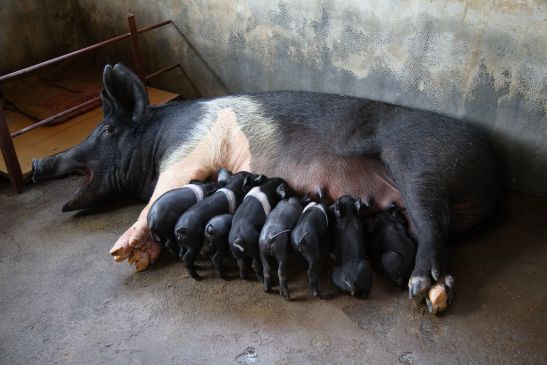As candidate vaccine fails against Ugandan strain, scientists push for region-tailored vaccines to tackle African Swine Fever

An international team of scientists has found that a promising African swine fever (ASF) vaccine, once hailed as a breakthrough, offers uneven protection depending on the virus strain—working against some while failing against others, including Uganda’s. The findings raise the need for region-tailored vaccines to tackle one of the world’s most devastating livestock diseases.
The research, led by the U.S. Department of Agriculture’s Plum Island Animal Disease Centre and the International Livestock Research Institute (ILRI), tested a commercial live-attenuated vaccine candidate, ASFV-G-ΔI177L, against strains collected from across Africa. Results revealed stark differences: the vaccine fully protected pigs when challenged with the same strain used to develop it, gave partial protection against a Ghanaian isolate, but failed entirely against strains from Uganda, Kenya, Malawi, and South Africa.
ASF remains a global threat to pigs and livelihoods, with no licensed vaccine yet available. The highly contagious and often fatal disease has wiped out millions of pigs in Africa, Asia, and Europe, crippling smallholder farmers and sparking food security concerns. In Uganda, where pork is the most consumed meat, outbreaks have repeatedly battered small-scale producers—many of them women and youth who depend on pigs for income.
Scientists say the findings point to a fundamental rethink of vaccine development. The traditional classification of ASF viruses by a single gene (p72) is proving inadequate, since genetically similar strains sometimes behave very differently. USDA researchers have developed a new whole-genome classification system, which they argue could be the key to matching vaccines with regional virus “biotypes.”
“Although much further corroborative work is needed, the classification developed will likely be the only available rational approach for deciding vaccination procedures to control and manage ASF outbreaks,” said USDA scientist Manuel Borca.
ILRI Senior Scientist Anna Lacasta added: “A one-size-fits-all solution is unlikely. We need targeted vaccines aligned with regional virus biotypes to maximize protection. There is need to support the development and licensing of vaccines based on circulating ASF strains.”
With ASF still ravaging herds across Africa, researchers stress that advancing region-specific vaccines, alongside stronger biosecurity and surveillance systems, will be critical to protecting pig farmers and securing pork supply chains.


 Uganda’s DEI Biopharma gene therapy breakthrough could transform sickle cell treatment
Uganda’s DEI Biopharma gene therapy breakthrough could transform sickle cell treatment
 KPMG flags widening execution gap as tech leaders bet on AI maturity, talent and partnerships
KPMG flags widening execution gap as tech leaders bet on AI maturity, talent and partnerships
 Kiira Motors’ Pearl to Cape Expedition delivers 820-bus order pipeline, recasting Africa’s electric mobility narrative
Kiira Motors’ Pearl to Cape Expedition delivers 820-bus order pipeline, recasting Africa’s electric mobility narrative
 Pearl to Cape electric expedition crosses 81pc mark as Kayoola E-Coach delivers hard performance data
Pearl to Cape electric expedition crosses 81pc mark as Kayoola E-Coach delivers hard performance data
 Kayoola’s Pearl to Cape odyssey eases Uganda’s electric mobility into a maturity phase
Kayoola’s Pearl to Cape odyssey eases Uganda’s electric mobility into a maturity phase
 Africa faces surge in AI fraud as deepfakes redefine identity threats, Sumsub warns
Africa faces surge in AI fraud as deepfakes redefine identity threats, Sumsub warns